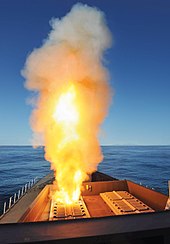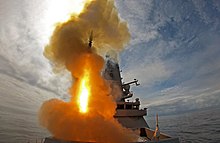PAAMS

The Principal Anti-Air Missile System (PAAMS) is a joint programme developed by France, Italy, and the United Kingdom for an integrated anti-aircraft warfare system. The prime contractor is EUROPAAMS, a joint venture between Eurosam (66%) and UKAMS (33%). In the United Kingdom, PAAMS has been given the designation Sea Viper.[1]
The system equips the Horizon-class frigates in French and Italian service as well as the British Type 45 destroyers.
Background
[edit]
PAAMS was originally intended to be deployed in the 'Common New Generation Frigate' (also known as the Horizon-class frigate) for the navies of the United Kingdom, France, and Italy.[2] The French DGA placed a contract with EUROPAAMS on 11 August 1999 for the development and initial production of the PAAMS warfare system along with the associated Long Range Radar (LRR) system. The contract included one PAAMS system and one LRR for each of the first British, French, and Italian new class of warships. Irreconcilable differences in the design requirements and workshare disagreements led to the United Kingdom leaving the 'Common New Generation Frigate' project in October 1999. After withdrawing, Britain instead decided to pursue a national warship design, designated the Type 45 destroyer. The United Kingdom remained committed to the PAAMS project.[3] As a result of efforts to achieve economies of scale, the PAAMS command and control system shares common architecture between the Horizon class and Type 45 destroyers. In 2009, PAAMS(S) was given the service name 'Sea Viper' by the Royal Navy.[1]
PAAMS components
[edit]- PAAMS(S) — British variant with SAMPSON Multi-Function Radar (MFR)
- PAAMS(E) — French/Italian variant with EMPAR Multi-Function Radar
- Automatic command and control system
- Consoles running Windows 2000 operating system
- Sylver Vertical Launching System
- Aster missiles:
- Aster 15, range; 1.7–30 km (1.1–18.6 mi)
- Aster 30, range; 3–120 km (1.9–74.6 mi)
Both variants of the PAAMS operate in conjunction with the S1850M Long Range Early Warning Radar.
Capabilities
[edit]

PAAMS is designed to track, target and destroy a variety of high-performance air threats, including saturation attacks of very low altitude, supersonic cruise missiles, fighter aircraft, and UAVs. PAAMS can launch eight missiles in under ten seconds with its Sylver Vertical Launching System, and simultaneously guide up to 16 missiles.[4] The PAAMS(S) variant consists of both the SAMPSON and S1850M long-range radars and is capable of tracking in excess of 1,000 targets at ranges of up to 400 km. BAE Systems also claims that its SAMPSON radar has "excellent detection of stealth aircraft and missiles".[5] Like the later baselines of the US Aegis Combat System, the PAAMS can engage multiple targets simultaneously.[6][7][8]
Testing
[edit]- During its first major warfare sea exercise aboard HMS Daring, the ship's Combat Management System crashed while under simulated air attack due to a power failure, and the ship lost use of its combat management system; the ship's crew reverted to use of binoculars to spot incoming airborne threats until the CMS had been restarted.[9]
- In 2009, two test firings of PAAMS in the British configuration from the Longbow trials barge failed due to "failures in the terminal phase of the engagement." It was believed that "production weaknesses" in a batch of Aster 30 missiles imported from France were to blame.[10]
- Beginning with HMS Dauntless in September 2010, all of the Royal Navy's Type 45 destroyers have successfully intercepted Mirach drones with Aster missiles at the Benbecula ranges off the Outer Hebrides, Scotland. Mirach is a 13 ft (4.0 m) jet that flies at speeds of up to 600 mph (970 km/h) at altitudes as low as 10 ft (3.0 m) or as high as 14,000 ft (4.3 km).[11][12][13]
- In April 2012, the Horizon-class frigate Forbin of the French Navy downed an American GQM-163 Coyote target simulating a sea-skimming supersonic anti-ship cruise missile travelling at Mach 2.5 (3,000 km/h, 1,900 mph) with an altitude of fewer than 5 metres (16 ft). It was the first time a European missile defence system destroyed a supersonic sea-skimming "missile". The trial was described as a "complex operational scenario".[14]
- In September 2013, HMS Daring of the Royal Navy demonstrated the ability of her Sea Viper system to detect and track at considerable range two medium-range ballistic missiles at the Ronald Reagan Ballistic Missile Defense Test Site in the Marshall Islands, US.[15][16]
- In May 2019, HMS Defender successfully used her Sea Viper system to destroy an incoming drone target as part of Exercise Formidable Shield.[17]
- In May 2019, the French frigate Bretagne destroyed a supersonic missile flying at more than Mach 2 (2,400 km/h, 1,500 mph) with one of her Aster 15s during exercise Formidable Shield.[18]
Operational history
[edit] France
France
 United Kingdom
United Kingdom
- On the night of 15 December 2023, the Royal Navy Type 45 Destroyer HMS Diamond shot down a UAV targeting commercial shipping in the Red Sea with a single Sea Viper (Aster).[20] The UAV is believed to have been launched by Houthi rebels in Yemen and marks the first time a Royal Navy ship has fired at an aerial target in anger since the Gulf War in 1991.[citation needed]
- On the night of 9 January 2024, the Royal Navy Type 45 Destroyer HMS Diamond engaged numerous UAVs targeting her and commercial shipping in the Red Sea with Sea Viper (Aster) missiles.[21] The UAVs were reported to have been launched by Houthi rebels in Yemen. The action was taken as part of a wider international operation to defend commercial shipping in the region.[22]
- On Wednesday 24 April 2024, HMS Diamond used a single Sea Viper (Aster) missile to shoot down a ballistic missile which had been launched from Houthi-controlled areas of Yemen and which according to American sources was likely targeting a container ship. It was the first time since the Gulf War of 1991 that the Royal Navy had intercepted any kind of missile in combat, when HMS Gloucester shot down an Iraqi Silkworm cruise missile. It is also the first time that the Royal Navy's Sea Viper system has shot down a ballistic missile in combat.[23][24][25]
Operators
[edit]Current operators
[edit]
 Algerian National Navy
Algerian National Navy
- Kalaat Béni Abbès class amphibious transport dock – one ship
 Egyptian Navy
Egyptian Navy
- Aquitaine-class frigates (FREMM) – one ship
- Bergamini-class frigates (FREMM) – two ships
 French Navy
French Navy
- Charles de Gaulle-class aircraft carriers – one ship
- Horizon-class frigates – two ships
- Aquitaine-class frigates (FREMM) – eight ships
 Italian Navy
Italian Navy
- Cavour-class aircraft carriers – one ship
- Orizzonte-class frigates – two ships
- Bergamini-class frigates (FREMM) – eight ships
- Thaon di Revel-class offshore patrol vessels – three ships
 Royal Saudi Navy
Royal Saudi Navy
- Al Riyadh-class frigates – 3 ships
 Royal Navy
Royal Navy
- Type 45 destroyers – six ships
Future operators
[edit] French Navy
French Navy
- FDI HN frigates – five ships
 Hellenic Navy
Hellenic Navy
- Kimon-class frigates – three ships (+ 1 in option)
 Italian Navy future fleet
Italian Navy future fleet
- Trieste-class landing helicopter docks – one ship
- Bergamini-class frigates (FREMM multiruolo +) – two ships
- Bergamini-class frigates (FREMM EVO) - two ships
- Thaon di Revel class – four ships
Potential operators
[edit] Hellenic Navy
Hellenic Navy
- Kimon-class frigates – one ship in option
See also
[edit]References
[edit]- ^ a b "Who dares wins - Royal Navy's newest warship arrives at her Portsmouth home" (Press release). BVT Surface Fleet. 28 January 2009. Archived from the original on 15 June 2009. Retrieved 28 January 2009.
- ^ Nicoll, Alexander (27 April 1999). "National differences scupper frigate project". Financial Times.
- ^ "Sampson flexes its muscles". Electronics Times. 7 June 1999.
- ^ Eurosam: Naval Systems - Aster 15 & 30/PAAMS Archived 10 August 2017 at the Wayback Machine (Official Eurosam website), Retrieved February 2014.
- ^ "Sampson Next Generation Multi-function Radar" (PDF). BAE Systems. 2011. Archived from the original (PDF) on 20 August 2016. Retrieved 5 August 2016.
- ^ "Lockheed contracts for two solid state radar SPY-7 sets for Aegis Ashore Japan". UPI. Archived from the original on 27 October 2021. Retrieved 30 June 2022.
- ^ Vale, Paul, ed. (3 February 2012). "PICTURES: The Royal Navy's £1bn Falklands Deterrent". huffingtonpost.co.uk. Archived from the original on 30 June 2021. Retrieved 4 August 2016.
- ^ "Lockheed contracts for two solid state radar SPY-7 sets for Aegis Ashore Japan". Archived from the original on 27 October 2021. Retrieved 27 October 2021.
- ^ "Building Britain's Ultimate Warship - Episode Guide - All 4". channel4.com. Archived from the original on 4 March 2016. Retrieved 4 August 2016.
- ^ Barrie, Douglas (7 May 2010). "MBDA Prepares For Further Sea Viper Testing". Aerospace Daily & Defense Report.
- ^ "HMS Daring fires Sea Viper for first time". www.gov.uk. Ministry of Defence. 19 May 2011. Archived from the original on 6 March 2016. Retrieved 5 August 2016.
- ^ "HMS Diamond fires Sea Viper missile for first time". www.gov.uk. Ministry of Defence. 1 May 2012. Archived from the original on 20 September 2016. Retrieved 5 August 2016.
- ^ "Defender ready to live up to her name after successful first Sea Viper firing". navynews.co.uk. Navy News. 16 May 2014. Archived from the original on 17 October 2017. Retrieved 5 August 2016.
- ^ "Interception d'une cible supersonique évoluant au ras de l'eau". defense.gouv.fr. French Ministry of Defence. 5 April 2012. Archived from the original on 19 April 2014. Retrieved 31 July 2016.
- ^ "Sampson radar - UK pursues at-sea missile defence capabilities". Naval Technology. 23 July 2014. Archived from the original on 26 September 2022. Retrieved 26 September 2022.
- ^ "Sea Viper (ASTER)". thinkdefence.co.uk. Archived from the original on 30 May 2020. Retrieved 6 April 2020.
- ^ ""HMS DEFENDER SHOWS HER POWER WITH MISSILE FIRING"". royalnavy.mod.uk. Royal Navy. 20 May 2019. Archived from the original on 10 December 2019. Retrieved 21 May 2019.
- ^ "Tir Aster 15 : la FREMM Bretagne intercepte une cible supersonique". Marine Nationale. 16 May 2019. Archived from the original on 23 May 2019. Retrieved 18 June 2021.
- ^ Vavasseur, Xavier (12 December 2023). "French Frigate Languedoc Intercepts Yet Another Drone from Yemen". Naval News. Retrieved 26 December 2023.
- ^ Shapps, Rt Hon Grant. "Confirmation of Sea Viper shooting down drone (Secretary of State for Defence)".
- ^ Shapps, Grant (10 January 2023). "Statement on Red Sea Attacks". X. Retrieved 10 January 2023.
- ^ "Red Sea: UK defence secretary says British forces will repel Houthi attacks". BBC News. 1 January 2024. Retrieved 10 January 2024.
- ^ "HMS Diamond shoots down Houthi missile". royalnavy.mod.uk. 25 April 2024. Retrieved 30 April 2024.
- ^ "HMS Diamond makes first Sea Viper anti-ballistic missile kill in action in the Gulf of Aden". Navy Lookout. 25 April 2024. Retrieved 30 April 2024.
- ^ Culley, Jeremy (26 April 2024). "Royal Navy destroyer HMS Diamond shoots down missile fired by Houthis in Yemen". Retrieved 30 April 2024.
